This year, the quality at the top is really limited to one obvious winner, the middle tiers are well populated, but the depth is very bad, with three films I question whether they should have been nominated.
Here we go.
10. Avatar: The Way of Water
Avatar 2 won’t be coming to streaming before the Oscars, and it’s just not worth dragging myself to the movie theater for what I fully expect to be a b-movie with fancy graphics like its predecessor was, so this will be brief. After watching the original, I felt insulted that people actually talked about it being a Best Picture favorite, and was prepared to be mad at the results at the 2010 Oscars. Thankfully, the Academy had the good sense to reward The Hurt Locker in what was in retrospect a very weak year for film (seriously, Up probably should have won, which gives you an idea of how weak the slate was -- as well as how excellent that particular Pixar film was).The second installment only has a 76% fresh rating on Rotten Tomatoes, which while good compared to most films, is very weak for Oscar consideration. The first film disguised a hackneyed script and weak cast with very pretty graphics, and the ads for the sequel indicate little has changed. The fact that director James Cameron has little respect for the peoples whose story he rips off with his white savior complex just makes things worse, turning the Avatar franchise into the indigenous slaughter equivalent of what Crash was for race relations. Hollywood really needs to stop embarrassing itself by making and then pouring accolades on these naive, tone-deaf insults.
9.5 What should have been nominated instead: Prey
If the Academy wanted to honor a genre film with indigenous overtones, they should have considered Prey. Easily the best Predator sequel ever (and honestly, I'd put it over the original by a mile as well), Prey treats its subjects with respect, features a largely Native American cast, tells a taut story, features a dog that can act rings around the likes of Zoe Saldana and Sam Worthington, and has incredible cinematography (with some of the best lit and filmed night action sequences I've seen in a long time). It is far from perfect and suffers from not having the same visual effects budget as Avatar, but in terms of quality of film, it's arguably a stronger candidate than the bottom three of the actual nominees.
9. Elvis
Elvis has some good points to it, but largely it's one of the weakest non-franchise entries into the Best Picture race in recent memory. It has absolutely zero nuance or complexity. Austin Butler does a good job with what he’s given, but his Elvis is a perpetual victim to whom things happen, with no agency in his own story. Ray and Walk the Line (which ironically had a much more human Elvis for the five minutes he appeared on screen there) were much better films because they looked at their protagonists with relatively unflinching eyes, exploring the various failings of their subjects. This film just uses Elvis as a punching bag for its star antagonist, Colonel Tom Parker.
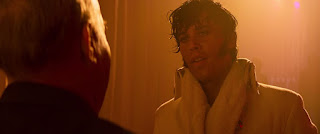 |
| Seriously, you'd never tell he was a drug addict except for two scenes in which he acts nothing like the rest of the film. |
Speaking of which, this is easily the worst performance of Tom Hanks’s career. Between his inability to keep the Colonel’s voice consistent, the embarrassing fat suit, and the sheer lack of subtlety, the entire endeavor is just a boondoggle. The plastic looking animated characters Hanks played in The Polar Express showed more expression.
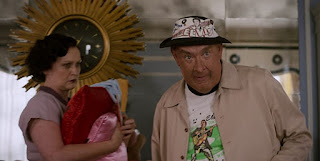 |
| I guess even great actors have serious misses. |
I've never been a Baz Luhrmann fan, as I find his films sacrificing substance for style. Elvis does not change that thinking.
8. Top Gun: Maverick
I honestly enjoyed watching Top Gun: Maverick and appreciate its good qualities, but it's just not a serious contender because of one fatal flaw: its script. It’s a great technical movie with some very good performances, but given the story takes the mission from Star Wars, the climax from Iron Eagle, its opening act from The Right Stuff, and then structures it all using the skeleton of the first Top Gun movie, it’s not exactly bursting with originality. Sequels need to take a cue from classics like The Godfather Part II and The Empire Strikes Back and realize the path to greatness is to capture the spirit of the original, not replay it note for note.
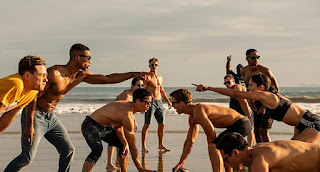 |
| Note to Hollywood: please stop making your sequels note for note remakes of the original. |
However, there are some excellent things to appreciate about the film. It is shot beautifully, with easily the most stunning aviation scenes ever put on film. It very much deserved its nomination for visual effects, and I am surprised it wasn't also recognized for its cinematography.
It also features a largely strong cast, with Miles Teller and Jennifer Connelly doing well playing off of Tom Cruise. Say what you want about Cruise, he is one of those actors that never takes a film off and never loses intensity -- you could ask him to spend a film miming being trapped in an invisible box or walking against the wind holding an invisible umbrella and he would still bring his A game. It would be interesting to see him act opposite Denzel Washington at some point.
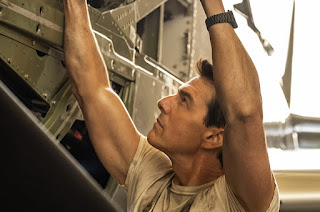 |
| He has made some interesting life and work choices, but you can't say he doesn't give it his all. |
Overall, Top Gun: Maverick I could see being honored as the last film onto the slate, a nod to the movie that helped save the year's box office from the doldrums of Hollywood's COVID years. The fact that it's above two other films on this list is kind of embarrassing.
7. Triangle of Sadness
Triangle of Sadness is a quirky black comedy in apparently the year for quirky films and black comedies.
Triangle of Sadness is largely about power dynamics and what our "civilized" society values versus what an unstructured society values. The luxury cruise that takes up much of the movie's run time is populated with some of the most useless rich people you'll ever encounter: arms dealers who've clearly never left their offices to experience the warfare they support, Russian oligarchs proud to let everyone know they deal in "shit", and influencers who are not so much wealthy as just prone to receive things for free if those things can somehow be associated with their pouty lips and rock hard abs online.
 |
| Absolutely useless. |
After dozens of minutes subjected to the whininess, casual empty philosophizing, and just shear uselessness of the cruise guests, you're ready to see something bad happen to them. Yet after the ship experiences a major disaster, the formerly powerless and now quite important staff becomes no less insufferable and self-oriented. Triangle of Sadness is not kind in its view about the human condition.
 |
| It's kind of a copout that the nicest one in this photo is also the prettiest. |
It’s a bit messy, where the film meanders a bit too much and approaches its central theme quite slowly at first. It’s the kind of film that I would have pegged as one of the last films onto the slate, as there was room for one more and this was different and crafted well enough to merit consideration. However, given it’s better than a third of the films nominated, there goes that theory. It’s one of those films that I enjoyed watching but doubt I’ll ever be in the mood to rewatch.
6. All Quiet on the Western Front
All Quiet on the Western Front is a perfectly competent war movie and adaptation of a classic in modern literature. Having said that, it's not the most memorable war movie nor the most amazing adaptation of a classic in modern literature. It suffers from coming on the heels of the masterful 1917 and the incredibly well crafted Dunkirk, because in comparison, it's just not that advanced in its filmmaking.
That doesn't mean that it's not a worthwhile film, though. It tells the story of German schoolboys who happily go off to war and of course learn quickly that war means horror, not adventure. It is the kind of story that makes Pippin and Merry and their evolution (from joining Frodo's quest on a lark to being wizened veterans who realize at the end that only Frodo and Sam understand what they've seen and done) my favorite thread of the Lord of the Rings books (sadly, the movies make the unwise choice of having Pippin and Merry fall in with Frodo and Sam by pure happenstance instead).
 |
| "Yes, yes! Let's go off to war! It'll be a lark!" |
The robbing of innocence that war subjects its participants and bystanders to is not only universal, it's key to the themes of the film. New recruits die en masse for underestimating the dangers present. Soldiers are faced with weapons that they'd not even dreamed of, participate in brutal hand-to-hand combat that leaves them shaken, and blanch at a fate of being permanently crippled. Even the impending armistice brings no safety, as the soldiers are imperiled by the brutality of the enemy, the incompetence of their own leadership, and even threats from the local civilian population tired of being taken advantage of.
 |
| Nothing ends well in war. |
War is hell, and All Quiet on the Western Front communicates that ably.
5. Women Talking
It’s hard to picture a movie feeling taut and stressful when it primarily consists of a group of people sitting in a space talking. But when the topic at hand revolves around whether a group of Mennonite women should escape the Bolivian enclave where they’re kept illiterate, often abused by their husbands, and frequently raped by other members of the community, or whether they should stay and fight for their rights while keeping their families together, let’s just say the stakes are raised.
From a structure and dramatic foundation perspective, the closest I can come to this movie is Twelve Angry Men. But instead of deciding the fate of another, these angry women are deciding their own fates, as well as those of their daughters. The fact that it revolves around systematic sexual assault and the ongoing denial by the church elders of the assaults actually happening — in the post-MeToo age nonetheless — makes this film a complete gut punch.
 |
| It is saddening how simultaneously naive and worldly these girls are due to their circumstances. |
As such, I can appreciate the craft that went into making it and be glad that I experienced it while also never wanting to see it again.
It’s a fantastic film, but it’s not the kind of movie you want to view just for a laugh. This one sticks with you for awhile.
What makes this all the more awful is the film, while purely fictional, is inspired by the very real rapes and denial that happened to a real-life Mennonite enclave. In that case, the perpetrators were actually arrested, tried, and convicted rather than bailed out by the men of the fictional enclave. As a result, I don’t believe a decision like the one dramatized here occurred. But the film will keep you on edge about what decision will be made, and even more so, whether the women be safe in enacting their decision.
 |
| Rooney Mara really needs more star turn opportunities. |
Rooney Mara, Claire Foy, and Sheila McCarthy do much of the heavy lifting, with McCarthy and Foy on extreme ends of the question being debated and Mara roaming the space in between. Frances McDormand plays a big part in the trailer to add her star power, but actually a very small bit part in the film itself.
4. Tár
Tár is a great character study and an absolute tour de force by Cate Blanchett. It has a real intelligence to it, providing a master class on classical music and conducting to the audience.
Tár emphasizes to you the cues that composers use to communicate their intent and message to the listener, and this property is mirrored in the use of nonverbal cues to communicate character intent and thoughts to the viewer. The film trades in unspoken glances and posture as a communication medium that overdubs the dialogue.
 |
| These quiet moments throughout the film are everything the dialogue lacks in terms of emotion. |
Blanchett does a terrific job walking the tightrope between making her character too sympathetic and too villainous. There are some interesting parallels that are really contrasts between her character and J.K. Simmons’ portrayal of the professor/band leader in Whiplash. Both are classic examples of the adage that you’re never the villain in your own story, though Tar is a billion times more subtle.
 |
| Fortunately, Blanchett doesn't throw a piano at a wall. |
Overall, I see why Tár was at the top of so many "Best of" lists for 2022. It just seems a bit decompressed, and I question if it couldn’t have been more effective with a tighter running time. As a result, it stands just outside the top ranks of my selections.
3. The Banshees of Inisherin
The Banshees of Inisherin is the first of three films I'd seriously consider for the Best Picture Oscar.
It is not an important film, but takes its spot due to its superb craftsmanship and stellar performances. The cinematography is stunning, using the landscape of its Irish island setting as an effective canvas on which it paints its tale. All four acting nominations were well earned, with perhaps Barry Keoghan's being the iffiest. The film's story benefits from all of this craft, and it's an interesting, multi-faceted one. So dark and yet so light at the same time.
 |
| I mean even the animals fit the canvas quite well. |
Deep down, the film is about the relationships that people have, in all their complexity. You can love and hate someone at the same time, and the people of Inisherin have reason to do both with regularity. A friend can be one's greatest asset and greatest annoyance at the same time. A young man can be both creepy and sweet at the same time. A brother can be the center of one's world and the thing that holds you back. A man can be an abusive bully and a caring father at the same time. We are complex, broken animals, and that brokenness can intermingle with others' in interesting, endearing, and terrifying ways. Banshees embraces all aspects of that complexity in a wonderfully interpersonal story.
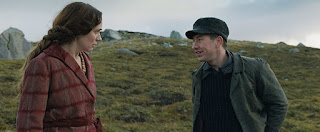 |
| Even the problematic relationships like this one are important. |
2. The Fabelmans
The Fabelmans: So. Fucking. Delightful!
Why do I get the feeling that there was more truth to this than most films that explicitly state “Based on a True Story”?
I normally rag on Spielberg’s endings, which I think often last a scene or two (or in the case of Ai, a whole bunch) too long, but this one was perfect!
Michelle Williams is as incredible as she always is. How did she become our generation’s Meryl Streep? Sadly, her excellence and her character’s range of emotions throughout the film overshadows the quiet, strong excellence of her co-star Paul Dano. It’s become apparent that a lot of Spielberg’s films are love letters to his father, and from this film, I can kind of see why.
 |
| Such a great job by these two. |
And Gabriel LaBelle. Holy cow, in the couple of hours of screen time he has, he morphs into the Steven Spielberg that made Jaws so incredibly. And I kind of want to see a Fabelmans sequel now, showing that start to his career.
 |
| The casting was an amazing bullseye on this one. |
This is really what filmmaking should be about: about craft, and emotion, and above all joy at what you’re doing. The fact that you can palpably feel it is a testament to the skill and artistry of Spielberg. It deserves all the accolades it’s received.
1. Everything Everywhere All at Once
I think the best way to describe Everything Everywhere All at Once is if someone took drafts of scripts for Being John Malkovich, The Matrix, Turning Red, and Brainsmasher, randomly shuffled the pages together, shot it, and somehow made it work. It is easily the most creative film we've seen in the Best Picture category in many years.
I can only imagine the joy the people who made this film had while making it. It is creativity unbridled by constraints of "what should happen", but done in a way that holds together quite well. The film has no end of absurdist moments that seem to have had no boundaries placed upon them, and that freedom allows a film that runs well over two hours to seem like a snap of the fingers compared to competing movies with surprisingly shorter runtimes.
 |
| Indeed. |
The focus of the film is the intertwined forces of family and fate. Are we the sum of our decisions, or are we something more, defined by our inextricable bonds with each other? It is from this exploration that Everything Everywhere All at Once gets its greatest strength: its heart. It makes the case for acceptance and vulnerability and, in the end, just accepting love as it is. As a result, the film finds deep emotion from things as absurd as a man and his raccoon, two women with hot dog fingers, and most importantly, two rocks sitting side by side on the edge of a cliff.
The cast is fantastic in pulling the emotional tapestry together and making it as real as can be in the midst of all the madness. Michelle Yeoh and Jamie Lee Curtis have both had career renaissances now in their silver years, and Ke Huy Quan has mounted an acting comeback for the ages with his supporting role.
 |
| The cast, like the family they play, are amazing and brilliantly unique. |
I imagine with the success of Everything Everywhere All at Once, there will be inevitable copycats, as Hollywood often looks to superficial trappings rather than the heart of a film when making decisions. But I hope that this will prediction will prove incorrect. Everything Everywhere All at Once is a singular achievement in creative film making and should stand alone unsullied by inferior copies.

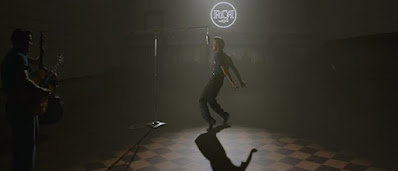


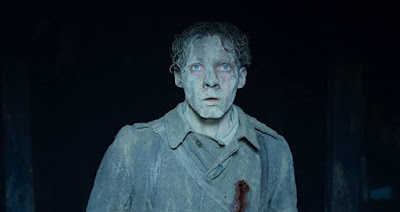




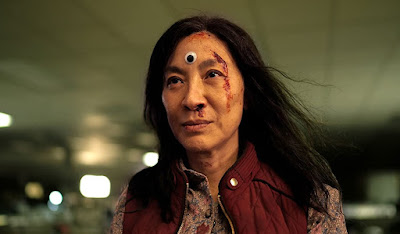
No comments:
Post a Comment